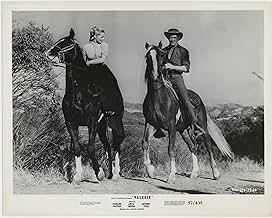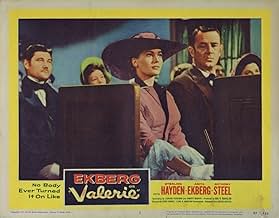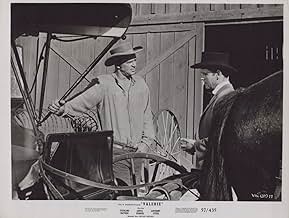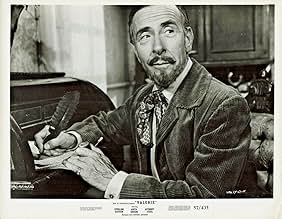After the American Civil War, former Union Major John Garth marries pretty settler Valerie but tragedy strikes and the two spouses end up in court where they give conflicting accounts of the... Read allAfter the American Civil War, former Union Major John Garth marries pretty settler Valerie but tragedy strikes and the two spouses end up in court where they give conflicting accounts of their marriage.After the American Civil War, former Union Major John Garth marries pretty settler Valerie but tragedy strikes and the two spouses end up in court where they give conflicting accounts of their marriage.
Jered Barclay
- Jim Mingo
- (as Jerry Barclay)
Robert Adler
- Lundy
- (as Bob Adler)
Chet Brandenburg
- Trial Spectator
- (uncredited)
- Director
- Writers
- All cast & crew
- Production, box office & more at IMDbPro
5.9497
1
2
3
4
5
6
7
8
9
10
Featured reviews
The Rashomon Bit
Sterling Hayden is the biggest rancher around. He's also on trial for killing his in-laws and critically wounding his wife, Anita Ekberg. On the witness stand he tells a tale of betrayal by Miss Ekberg with handsome pastor Anthony Steel and unremitting carping by the older people. But when his wife gives testimony on her sickbed, a different version may emerge.
There's a bit of RASHOMON impulse her,e an attempt to use a subjective camera from several several viewpoints. It ultimately gives way to the objective standard; there can be only one truth. It is, however, the playing around with that uncertainty that lends this movie its initial interest. In the end, alas, it becomes a peculiarly squeamish piece of brutality, with scars from burns neatly blackened circles of smooth skin. It was the odd screen persona that Hayden cultivated in the 1950s: low-affect anger that Huston used so effectively in THE ASPHALT JUNGLE became his stock in trade, a character who couldn't feel like a human being. Unfortunately it hangs too apparently over this movie, removing all ambiguity.
There's a bit of RASHOMON impulse her,e an attempt to use a subjective camera from several several viewpoints. It ultimately gives way to the objective standard; there can be only one truth. It is, however, the playing around with that uncertainty that lends this movie its initial interest. In the end, alas, it becomes a peculiarly squeamish piece of brutality, with scars from burns neatly blackened circles of smooth skin. It was the odd screen persona that Hayden cultivated in the 1950s: low-affect anger that Huston used so effectively in THE ASPHALT JUNGLE became his stock in trade, a character who couldn't feel like a human being. Unfortunately it hangs too apparently over this movie, removing all ambiguity.
He says, she says, he shoots
If not for Ernest Laszlo's competent photography, "Valerie" would be a complete fiasco, exploiting the points-of-view concept of "Rashomon" minus any humanistic insights. In the first scene, a Civil War veteran, 40-year-old rancher John Garth (Sterling Hayden), is arrested for shooting his 26-year-old wife Valerie (Anita Ekberg) and her parents. She survives; they don't.
The trial commences with testimony which is shown in flashbacks. We start with Garth's point of view, in which Valerie is a wine-swilling gold-digger who, once she finds out he is still paying off his father's debts, shuns him in favor of playing footsie with his brother Herb (Peter Walker) and seducing the local padre, Reverend Blake (Anthony Steel), whose child she is carrying when Garth shoots her.
Testifying from a bed in the infirmary, Valerie claims to be an innocent victim. Her parents, recent immigrants, persuaded her to marry Garth, who mistreated her, pouring liquor down her throat before taking her to bed, and striking her. In her distress, she sought only rapport with her brother-in-law and only counsel from the handsome Rev. Blake, who eventually rescued her and returned her to her parents' homestead, where Garth found and shot them.
Who's telling the truth? Who cares.
Lurid marketing focused on Ekberg's upper assets, including whorls of blond hair, and I was rather amazed none of the buttons popped off her taut blouses and bodices, which are typical of the total lack of subtlety in the entire melodrama. Ekberg plays her part and displays her parts well enough, but Sterling Hayden breaks his own personal record for stiff acting.
The whole debacle was cheaply filmed at the Iverson Ranch in California, the location of a raft of TV westerns from "The Lone Ranger" to solid fare like "Gunsmoke" and "Bonanza," any episode of which is better than "Valerie."
The trial commences with testimony which is shown in flashbacks. We start with Garth's point of view, in which Valerie is a wine-swilling gold-digger who, once she finds out he is still paying off his father's debts, shuns him in favor of playing footsie with his brother Herb (Peter Walker) and seducing the local padre, Reverend Blake (Anthony Steel), whose child she is carrying when Garth shoots her.
Testifying from a bed in the infirmary, Valerie claims to be an innocent victim. Her parents, recent immigrants, persuaded her to marry Garth, who mistreated her, pouring liquor down her throat before taking her to bed, and striking her. In her distress, she sought only rapport with her brother-in-law and only counsel from the handsome Rev. Blake, who eventually rescued her and returned her to her parents' homestead, where Garth found and shot them.
Who's telling the truth? Who cares.
Lurid marketing focused on Ekberg's upper assets, including whorls of blond hair, and I was rather amazed none of the buttons popped off her taut blouses and bodices, which are typical of the total lack of subtlety in the entire melodrama. Ekberg plays her part and displays her parts well enough, but Sterling Hayden breaks his own personal record for stiff acting.
The whole debacle was cheaply filmed at the Iverson Ranch in California, the location of a raft of TV westerns from "The Lone Ranger" to solid fare like "Gunsmoke" and "Bonanza," any episode of which is better than "Valerie."
Angel or demon?
Like in "the iron sheriff" ,which also features Hayden as the lead,the movie begins when many important events happened .
In this whodunit disguised as western, the hero wanted to piece together the past ,meeting several suspects ,during his son' s trial .We watched the story through different eyes .
The same goes for "Valerie" which is nothing but a long flashback;whereas the scenes are told by the hero or his lawyer or by the showdown's victim,the story takes an entirely new meaning .The main inspiration is not the traditional western,but rather Japanese Kurosawa's "Rashomon"(1950) -which was remade by Martin Ritt as ""the outrage" (1964) The story sustains interest throughout ,except for the final scenes which are botched.Anita Ekberg possesses enough ambiguity to pass for an angel or a demon.Sterling Hayden is ,as usual,an imposing individual,even in the scenes of his trial when he is supposed to keep a low profile.
In this whodunit disguised as western, the hero wanted to piece together the past ,meeting several suspects ,during his son' s trial .We watched the story through different eyes .
The same goes for "Valerie" which is nothing but a long flashback;whereas the scenes are told by the hero or his lawyer or by the showdown's victim,the story takes an entirely new meaning .The main inspiration is not the traditional western,but rather Japanese Kurosawa's "Rashomon"(1950) -which was remade by Martin Ritt as ""the outrage" (1964) The story sustains interest throughout ,except for the final scenes which are botched.Anita Ekberg possesses enough ambiguity to pass for an angel or a demon.Sterling Hayden is ,as usual,an imposing individual,even in the scenes of his trial when he is supposed to keep a low profile.
A Fresh Look at the Western
The western was generally a male-dominated genre, so it is unusual to come across one bearing the name of a female character for its title. Even a film like Nicholas Ray's "Johnny Guitar", which features two strong women played by Joan Crawford and Mercedes McCambridge, bears the name of one of the male characters. "Valerie", however, is not a typical western. Most westerns from the fifties tended to revolve around a few well-worn themes- Cavalry versus Indians, lawman versus outlaws, wagon train, range war over grazing rights, cattle drive, etc. This one is different. Indeed, it might be more accurate to describe it not as a western but rather as a courtroom thriller or domestic melodrama which just happens to be set in the Old West. Unlike most westerns, the story could, with only a few minor changes of detail, be transferred to virtually any other part of America- or, indeed, to many other countries- at virtually any other period in history. This perhaps explains why it was made in black-and-white; although colour was increasingly becoming the norm for traditional westerns in the late fifties, monochrome was still commonly used for psychological dramas.
As the film opens, a wealthy rancher named John Garth is tried for shooting his beautiful young Hungarian-born wife Valerie, critically wounding her, and murdering her parents. Most of the story is told in a series of flashbacks, using for a framework the testimony given in the courtroom by various characters. The two main witnesses are Garth himself and Valerie, who has by now recovered sufficiently to give her evidence from her hospital bed. As might be expected, the two give very different accounts of their marriage. His testimony is that she was a cold, unloving wife who was unfaithful to him with his own brother and with the local preacher, the Reverend Blake, that her parents constantly interfered in the marriage and that the shooting was either a crime of passion or self-defence. She testifies that he was a brutal, foul- tempered husband who wrongly and unreasonably accused her of adultery in an attempt to justify the violence he wreaked on her in his frequent rages.
The film has been compared to Kurosawa's influential "Rashomon", which also told its story from several different viewpoints, although as another reviewer points out, there is a difference. In Kurosawa's film the various conflicting viewpoints were all presented as equally valid, implying that truth is something subjective, whereas here truth is treated more objectively. One of the parties is telling the truth and the other is lying. Which of the accounts is true and which is false is revealed in the final denouement.
This made Valerie a difficult role to play, as the actress playing her needed, effectively, to play two quite different characters, both the innocent wronged wife which Valerie claims to be and the heartless, promiscuous seductress which is how her husband depicts her. The role therefore needed someone more accomplished than the Swedish sex symbol Anita Ekberg who always, or so it seemed to me, got by more on looks than on talent, at least in her English-language movies. (She was perhaps fortunate that the early part of her career came in the fifties, at a time when the film industry seemed particularly obsessed with voluptuous blondes- Monroe, Dors, Mansfield, Bardot, Van Doren, et al.) Here she is rather disappointing, failing to portray either of the two Valeries with any great conviction. Sterling Hayden, however, is more convincing as Garth, possibly because the difference between the two versions of Garth's character is not as great. Even on his own testimony Garth is an unhappy, tormented man, haunted by memories of the Civil War in which he was responsible for torturing Confederate prisoners in order to extract information from them. The Reverend Blake is played by Ekberg's real-life husband, Anthony Steele.
I had never heard of this film until I caught it when it was recently shown on television, and I note that mine is only the third review it has received, suggesting that it is not very well known. Yet despite the weakness of its leading actress, I feel that this is one of those westerns that deserves to be better known. Its German-born director Gerd Oswald handles his material well and the unusual subject-matter makes the film a welcome and refreshing change. 7/10
As the film opens, a wealthy rancher named John Garth is tried for shooting his beautiful young Hungarian-born wife Valerie, critically wounding her, and murdering her parents. Most of the story is told in a series of flashbacks, using for a framework the testimony given in the courtroom by various characters. The two main witnesses are Garth himself and Valerie, who has by now recovered sufficiently to give her evidence from her hospital bed. As might be expected, the two give very different accounts of their marriage. His testimony is that she was a cold, unloving wife who was unfaithful to him with his own brother and with the local preacher, the Reverend Blake, that her parents constantly interfered in the marriage and that the shooting was either a crime of passion or self-defence. She testifies that he was a brutal, foul- tempered husband who wrongly and unreasonably accused her of adultery in an attempt to justify the violence he wreaked on her in his frequent rages.
The film has been compared to Kurosawa's influential "Rashomon", which also told its story from several different viewpoints, although as another reviewer points out, there is a difference. In Kurosawa's film the various conflicting viewpoints were all presented as equally valid, implying that truth is something subjective, whereas here truth is treated more objectively. One of the parties is telling the truth and the other is lying. Which of the accounts is true and which is false is revealed in the final denouement.
This made Valerie a difficult role to play, as the actress playing her needed, effectively, to play two quite different characters, both the innocent wronged wife which Valerie claims to be and the heartless, promiscuous seductress which is how her husband depicts her. The role therefore needed someone more accomplished than the Swedish sex symbol Anita Ekberg who always, or so it seemed to me, got by more on looks than on talent, at least in her English-language movies. (She was perhaps fortunate that the early part of her career came in the fifties, at a time when the film industry seemed particularly obsessed with voluptuous blondes- Monroe, Dors, Mansfield, Bardot, Van Doren, et al.) Here she is rather disappointing, failing to portray either of the two Valeries with any great conviction. Sterling Hayden, however, is more convincing as Garth, possibly because the difference between the two versions of Garth's character is not as great. Even on his own testimony Garth is an unhappy, tormented man, haunted by memories of the Civil War in which he was responsible for torturing Confederate prisoners in order to extract information from them. The Reverend Blake is played by Ekberg's real-life husband, Anthony Steele.
I had never heard of this film until I caught it when it was recently shown on television, and I note that mine is only the third review it has received, suggesting that it is not very well known. Yet despite the weakness of its leading actress, I feel that this is one of those westerns that deserves to be better known. Its German-born director Gerd Oswald handles his material well and the unusual subject-matter makes the film a welcome and refreshing change. 7/10
Despite some less than stellar acting by Ekberg, it's an excellent film.
"Valerie" is a movie that only gets better the more you watch of the film. Up until the last 15 minutes or so, I wasn't that impressed with the story (or Miss Ekberg's acting) but it all got very exciting towars teh end...making it well worth seeing.
The story begins with a mass murder. John Garth (Sterling Hayden) leaves a home after a shooting which left three people dead and his wife shot and close to death. The film shows both his account and hers of the events leading up to the shooting...a shooting he claims was in self defense. What really happened?
In some ways, this story is like the classic Japanese film "Rashomon", though instead of three viewpoints you have two...and teasing apart what REALLY happened is a bit easier in "Valerie". It's a simpler story...but still well done. As I mentioned above, my only quibble was some of Ekberg's acting....it often wasn't great and her accent was a bit thick, so, if possible, watch with captions.
The story begins with a mass murder. John Garth (Sterling Hayden) leaves a home after a shooting which left three people dead and his wife shot and close to death. The film shows both his account and hers of the events leading up to the shooting...a shooting he claims was in self defense. What really happened?
In some ways, this story is like the classic Japanese film "Rashomon", though instead of three viewpoints you have two...and teasing apart what REALLY happened is a bit easier in "Valerie". It's a simpler story...but still well done. As I mentioned above, my only quibble was some of Ekberg's acting....it often wasn't great and her accent was a bit thick, so, if possible, watch with captions.
Did you know
- TriviaAnita Ekberg and Anthony Steel were married about six months before production began, and this is the only film they made together during their marriage. They divorced in 1959.
- GoofsAt 53 minutes in when Valerie and John are out riding, John gets off his horse to open the gate; as he moves toward it, the shadows of the camera and cameraman are visible on the ground.
- Quotes
John Garth: Valerie is alive?
Details
- Runtime
- 1h 22m(82 min)
- Color
- Sound mix
Contribute to this page
Suggest an edit or add missing content


































